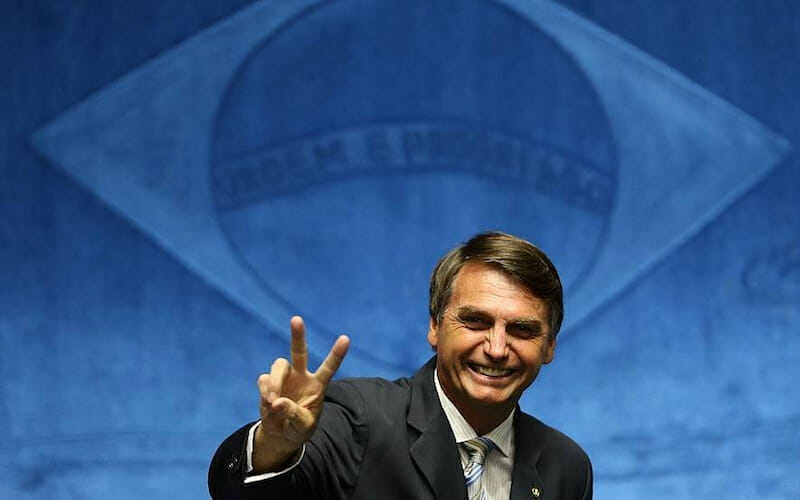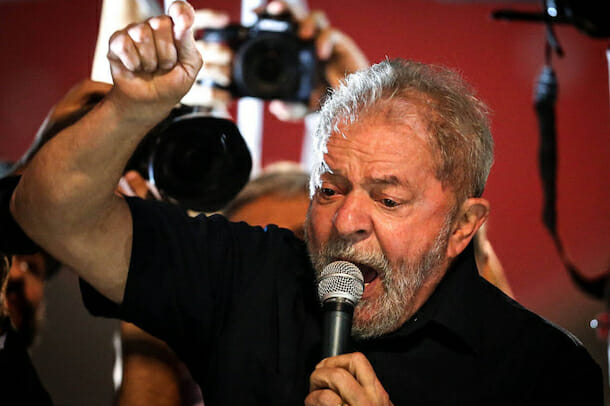
Jair Bolsonaro: The Brazilian Trump
This year’s Brazilian presidential election is something to watch. Brazil has 13 presidential candidates from a variety of backgrounds. Some are old well-known political players, and conversely deeply hated by voters and some are new to the scene. One candidate in particular has been grabbing the spotlight: Jair Bolsonaro.
Love him or hate him, Bolsonaro has been gradually making headlines for the past few years in a trajectory that’s eerily similar to that of President Donald Trump. Bolsonaro’s brash, abrasive speech, small, die-hard legion of supporters, talent for unfiltered commentary and even some of his proposed policies create a parallel with the current POTUS that warrants a closer look.
The Outsider’s Insider
Part of Trump’s appeal in the 2016 race was in framing himself as a political outsider. The fact that so many blue collar Americans found it easy to identify with the billionaire businessman/celebrity from New York is a result of Trump’s charisma. It still baffles the mainstream media and many pundits, to be sure, but the fact remains that he was viewed by many as an ordinary, hard-working man who just wanted to make things right in the country, not as career politician who routinely rigs the system in favor of his own interests.
What many voters ignored is that Trump, as a businessman, had to “get along with all politicians” (his own words). To point out that the Clintons were invited to Donald’s wedding to Melania, and that Bill was a frequent player at Trump’s golf course in Westchester is to point out the social column’s tip of the iceberg. That’s not to say Trump had deep influence in politics behind the scenes, but in the worlds of big business and politics, no major player in one field is a complete outsider in the other.
When it comes to Bolsonaro, the story is slightly different. He is a retired army captain who’s been has been reelected to the Brazilian Congress since 1990. So, how does a career politician of almost 30 years manage to present himself as an outsider? Not so differently than a well-connected, powerful businessman. Bolsonaro and Trump both fight in the cultural arena — and say what they think. While traditional politicians measure every line and comma in their speeches, trying to make their words fit into cultural mainstream patterns in order to not “offend” anyone, both Trump and Bolsonaro simply spit out what they think. Political correctness is not a game either one likes to play. For many electors, American and Brazilian alike, an unfiltered candidate who verbalizes what many of them are sitting at home thinking to themselves is a refreshing image; one that comes associated with the “outsider” label.
It doesn’t matter if he’s been a politician for nearly thirty years, or if he’s been cozying up to politicians his whole life, if he doesn’t sound like what the public has been trained to see as a politician, then he’s an outsider.
In Trump’s case, openly criticizing the GOP establishment certainly helped build his outsider case. For Jair Bolsonaro, in his many years navigating the myriad of Brazilian political parties, he’s switched affiliations more than a couple times. His current bid for the presidency comes through one of the smallest of them all. The Social Liberal Party (PSL) has roughly two hundred thousand registered members, a stark contrast with the over two million members of the country’s biggest party, the Brazilian Democratic Movement (Movimento Democrático Brasileiro, MDB).
It helps Bolsonaro that he wasn’t widely known to the public outside his home state of Rio de Janeiro until about 2014, when his social media presence grew in the form of YouTube videos and memes, mostly shared on Facebook. To complete the picture, Bolsonaro has never been figured in a corruption scandal. Due to the widespread corruption in the Brazilian government, in the eyes of many voters, not being involved in a scandal is enough to categorize Bolsonaro as an outsider to the political game.
The Culture War
Any discussion of Trump that doesn’t involve a discussion of culture is incomplete. The same goes for Bolsonaro. The US has seen a cultural chasm widen between its progressives and the conservatives. Partisanship has become the name of the game in American politics, with each side clinging more firmly to its ideologies and worldviews, and with attacks substituting for civilized debate and amicable disagreement. As the Coastal elites push their agenda through the mainstream media, conservative Middle America turns to radio and alternative Internet content. Brazil has been witnessing a similar phenomenon. Brazilian mainstream content creators take their cues straight from Hollywood, not unlike the news channels that take theirs from CNN.

Both conservatives and liberals in Brazil are also taking to YouTube and Facebook for alternative content that reflects their views. In some cases, that reflects support for Bolsonaro. Just as Trump gained popularity with a segment of Americans by brushing off accusations of being a racist as he pushed for more border security and a crackdown on illegal immigration, Bolsonaro wins points for proposing harsher punishment to criminals.
Crime is rampant in Brazil. Of the 50 most dangerous cities in the world, 17 are in Brazil. While hardworking Brazilians are robbed at gunpoint or even murdered for a cellphone, the progressive media insists on a narrative that suggests that crimes are only committed by the poor and desperate, and therefore criminals deserve sympathy more than jail time. That’s not only offensive to the many poor and desperate who never break the law, but a major undermining of the country’s constant struggle with organized crime.
There’s no simple solution for crime in Brazil. However, when Brazilians are not only victimized by violence, but constantly accused of racism for asking that criminals pay for breaking the law, candidates like Bolsonaro, who calls for harsher punishment of criminals, including the chemical castration of rapists , begin to look attractive. If many Americans, tired of being called racists, voted for Trump, a lot of Brazilians are doing the exact same with Bolsonaro.
The Outrageous Statements and Pushback
Bolsonaro is not far behind Trump when it comes to making outrageous statements. Some may even say the Brazilian politician often leaves his American counterpart in the dust.
In a 2011 interview, Bolsonaro said he couldn’t possibly love a gay son. In another interview, he said the mistake of the old Brazilian military dictatorship was to have tortured, but not murdered, its more radical dissidents. Bolsonaro responded to a fellow congressman who supposedly accused him of being a rapist by saying that he wouldn’t rape her because “she didn’t deserve it” — implying that some women “deserve” to be raped, which is absurd.
Brazilian mainstream media hates Bolsonaro as much as their American counterparts hate Trump — only there’s no Brazilian Fox News to sing Bolsonaro’s praises. There’s a lot to criticize about both Trump and Bolsonaro, but the constant hammering by the media creates the opposite effect: their supporters just tune the critics out.
American mainstream media has seen its ratings decline alongside the public’s trust. According to a Gallup poll published in April 2017, 62% of Americans “say news media favors one political party over the other.” When it comes to Brazil, there’s conflicting information. While a 2015 article from one source states that only 13% of Brazilians always trust the information provided by news outlets, compared to 21% that never do. Another 2017 news report reveals that Brazil is in second place worldwide when it comes to public trust in the media, at 60%. While each article cites a different study, each executed years apart and following a different methodology, the disparity in findings only serves to sow deeper doubts.
It’s in a climate of mistrust of the media that Bolsonaro — much like Trump — thrives. His most ardent supporters call him “the myth,” praising his vicious responses to personal attacks. Bite-size videos of him verbally “punching back” become viral, and end up earning him fans for the simple fact of not coming from the mainstream media, and therefore seen as “the truth that’s been hidden from us.”
Meme Culture and Fake News
Like Trump, Bolsonaro has a strong base of supporters who are very active online. They share clips of him and create memes. They call him “the myth,” and portray him as a cool figure who’ll fix the country by blurting out what he thinks is wrong with it. Bolsonaro also accuses his critics of spreading “fake news” about him. On his official website, right next to the “home” tab, there is a tab for “the truth.” In this section, the website provides Bolsonaro’s version of “each fact and news” regarding the candidate. In positioning himself as the detainer of the truth in opposition of a media that “lies,” Bolsonaro, like Trump, pulls his supporters even closer.
An Imperfect Emissary of the Silent Majority
Just like Trump, Bolsonaro has two different kinds of supporters. There are the grassroots supporters: his fans, the ones who call him a “myth” and think everything he says (even the truly revolting stuff) is on point; and there are the disenfranchised, the ones who don’t feel represented by any other candidate, but see in Bolsonaro an imperfect emissary of the values they hold dear.
To many Brazilians, this year’s presidential election feels just like Trump vs. Hillary felt to many Americans: like there isn’t a candidate that truly represents them. In Brazil, there’s the added feeling that voting for the few with integrity is to throw your vote away, since they have no more than 2% of voting intention, and therefore don’t have a real chance. With political and social climates growing more divided, Bolsonaro is sure to receive many votes from people who will “hold their nose and vote” so as to not see the “other side” win. That might not be real support, but it might be enough for a win.
Does Bolsonaro have a Chance?
In the current Brazilian political climate, it’s hard to say. The country has a system of direct vote. There are no primaries or delegates. There are 29 political parties and a system of alliances in place to push each of the 13 presidential candidates. According to a recent poll, Bolsonaro is in second place with 19% of the electorate.
Bolsonaro’s biggest adversary, former president Lula, however, is currently in jail for corruption. The Brazilian Electoral Superior Court declared Lula as ineligible to run on September 2nd, and his party was given 10 days to officially switch candidates. Nonetheless, it is possible for Lula to appeal — which he will certainly do. Many polls are pointing at Bolsonaro making it to the final round with or without the former president in the ballot.
In the final round, the top 2 candidates face off in another vote. According to Brazilian law, this second round occurs when the candidate with the majority of votes wins the first round, but fails to achieve more than half of valid votes. Brazil hasn’t seen an election won in the first round since 1998.
In Brazil, voting is not only direct, but mandatory. Trump may have won the election more due to Hillary’s failure to drive Democrats to the polls than due to his own accomplishments as a candidate. Bolsonaro has no such luxury. It’s true that all major candidates in this year’s election suffer with high rates of rejection, but so does he. If it comes to a second round between Bolsonaro and another candidate, when forced to choose, the majority of Brazilians might decide he’s too unpalatable. It will all depend on who’s on the final ballot.
11% of the electorate is still undecided, according to the August 22nd poll. That’s a huge number to fight for. It might give room for Bolsonaro to grow, or for an actual outsider like economic liberal and first-time candidate Amoêdo, to gain some ground.
We can’t forget that most polls pointed to Hillary as a clear winner in 2016. Many American pundits failed to take into consideration the appeal Trump had with disenfranchised blue collar Americans, and the risk in Brazil is that the country’s middle-class might be more than ready to cast what many will see as a protest vote in favor of Bolsonaro.
The 11% of undecided also might not actually be undecided. Just like many Trump supporters didn’t tell pollsters who they intended to vote for, it’s possible that people are keeping private their intentions to vote for such a polemical candidate as Bolsonaro, therefore skewing the polls. In conclusion, anything is possible.

